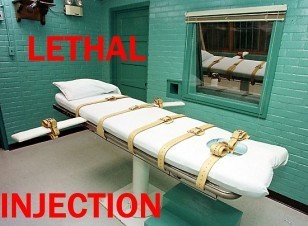JACKSON, Ga. - A man who claimed his attorney was a racist who put up a flimsy defense was executed Wednesday for murdering two people, Georgia's second execution within a month.
Curtis Osborne, 37, was executed at 9:05 p.m. at the state prison in Jackson. Osborne did not request a special last meal and refused to eat a cheeseburger. He did not make a final statement.
Osborne's execution was delayed for about two hours because the U.S. Supreme Court was considering his final appeal and then prison officials could not find a vein. While the lethal cocktail of drugs was administered, Osborne's eyes opened at one point and he took a deep breath. His eyes then closed again.
Osborne, who is black, was sentenced to death for the August 1990 fatal shootings of Linda Lisa Seaborne and Arthur Jones. The two were found shot to death in a car by the side of a dirt road in Spalding County, which is about 35 miles south of Atlanta.
After he was convicted, he claimed his attorney Johnny Mostiler, who is white, referred to him by a racial slur and refused to tell Osborne that prosecutors offered a life sentence for a plea. He also claimed Mostiler, who died in 2000, told another client that Osborne deserved the death penalty.
Prosecutors dismissed those allegations. Griffin Judicial Circuit District Attorney Scott Ballard called them ``outlandish.''
Like the nation's high court, the Georgia Supreme Court also refused Wednesday to halt the execution. On Monday, a Georgia parole board declined Osborne's plea for mercy.
Osborne's case attracted the attention of former president Jimmy Carter and former U.S. Attorney General Griffin Bell, who both urged state officials to commute the death sentence to life without parole.
Norman Fletcher, the ex-chief justice of the Georgia Supreme Court, showed up in person Monday to ask for leniency. It was the first time he had made such an appearance, but he said he was drawn in by the ``extraordinary nature'' of the case.
The lethal injection took 14 minutes to kill Osborne, which concerned protesters who held a vigil at the prison's entrance.
``That was another signal that proves there is a problem with lethal injections,'' said Sara Totonchi of the Southern Center for Human Rights, one of about two dozen protesters. ``This yet another reason why we must stop executing people until we know more about lethal injection.''
Osborne was the fourth person in the nation executed since the U.S. Supreme Court upheld the constitutionality of lethal injection. Georgia's execution of William Earl Lynd on May 6 was the first in the nation after a seven-month halt on capital punishment.
Friday
August 22nd, 2025
11:13AM









